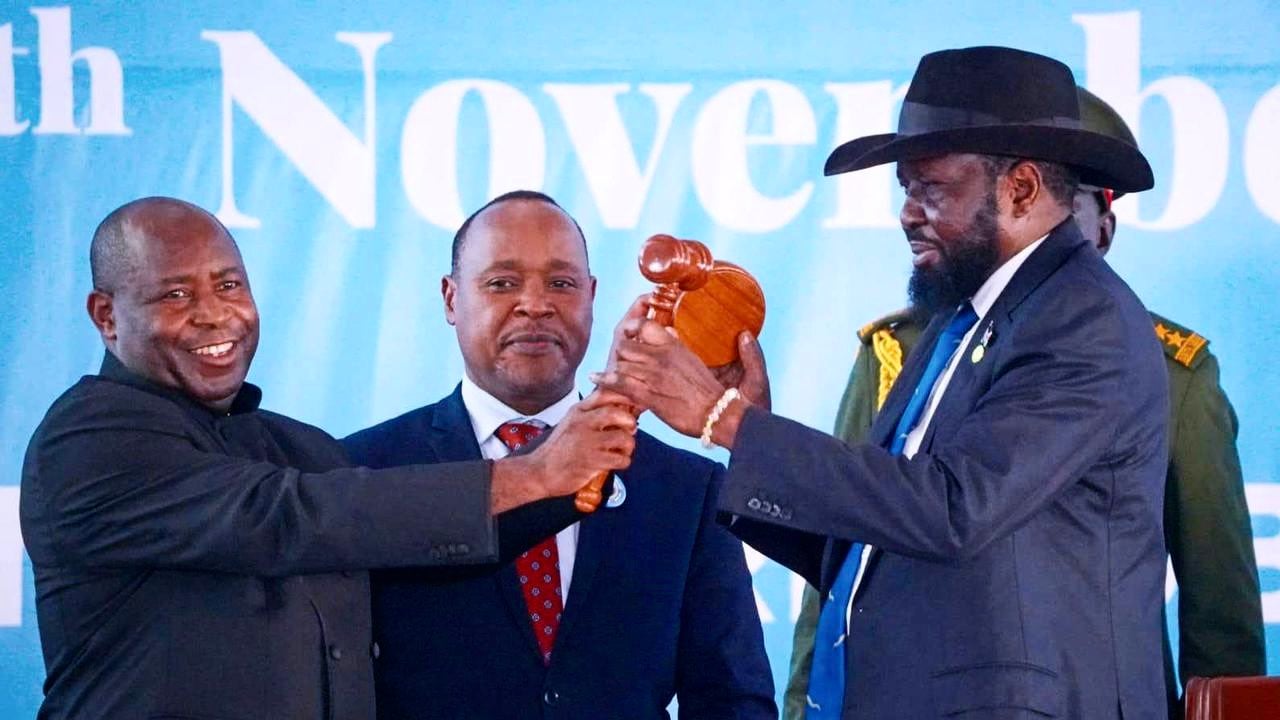
Burundi’s president Evariste Ndayishimiye (left) hands over instruments of power to South Sudan president Salva Kiir as then EAC chairperson Peter Mathuki (centre) looks on during the EAC Summit of heads of state in Arusha, Tanzania, in November 2023. PHOTO/COURTESY
There were few pleasantries exchanged as lawmakers of the East African Legislative Assembly (Eala) congregated in Arusha, Tanzania, this past week. The dicey issue of failed remittances came to a head when Didier Mazenga, the Democratic Republic of the Congo’s (DRC) East African Community Affairs minister, had his swearing-in as an ex-officio member of the regional assembly stopped. This as protests over arrears totalling $14m (Shs52b) by Mr Mazenga’s country rose to a crescendo.
Other partner states with outstanding arrears include: Burundi ($11m), South Sudan ($8m), and Rwanda ($920,000). Also featured on the arrears’ list are the original partner states, including Uganda ($200,000), Tanzania ($122,000), and Kenya ($20). Uganda’s Eala representatives were particularly vocal about the DRC’s failure to remit a single coin since being admitted to the community, with Mary Mugenyi saying their lawmakers should suffer the ignominy of attending plenary sessions remotely.
The standoff is a microcosm of what is ailing the East African Community (EAC) that counts as many as eight partner states. Yet back in the Ugandan capital, Kampala, goodwill for integration is hardly in scant supply. Albeit more in words than deeds.
“When you look at our trade as a country, last year, 58 percent of our exports were within East Africa. That means we are reaping from the regional market, and without this regional market, Uganda would not be okay.,” Ms Noeline Kisembo, the immediate past chairperson of Uganda’s House Committee on East African Community Affairs, told Sunday Monitor.
“We need to understand why we are integrating and why we want to be together. We want to come together so that we will have an expanded market as a region. We cannot consume all that we produce. The bulk of what we produce is agricultural produce, and through this partnership and integration in the region, we have accessed the market, which probably we would not be able to access.”
While the EAC partner states are still at the consultation level to form the EAC confederation constitution, Ms Kisembo told Sunday Monitor that the one for Uganda was suspended due to a lack of budget support.
“The process to form the EAC confederation constitution is still at the consultation level, but somewhere midway they were halted due to a lack of consultation budgets,” she disclosed. “We have tried to implement most of the protocol initially as prescribed, but you know you can’t move at the same pace desired.”
Sticking points
Early this year, this publication established that the Committee on East African Community Affairs conducted field visits to Busia, Malaba, Katuna, Busanza, Kyanika, and Bunagana border points to establish the status of the border operations and assess the cooperation contributions to the East African Community Affairs integration process.
In their findings, the lawmakers deduced that while the region embarks on a series of consultations and negotiations for political confederation, there is a need for a massive awareness campaign about the benefits of regional integration.
Ms Kisembo said she discovered that Ugandan traders were being bullied by neighbouring countries to dump their produce while trading across borders due to a language barrier, and that there is an urgent need to introduce it as an examinable subject to compel Ugandans to embrace it.
“The Ministry of East African Community Affairs should step up the sensitisation campaign to enhance, deepen, and widen the integration in the region. The Kiswahili language should be popularised as a way of integrating and unifying communities,” Ms Kisembo said.
In their report, the lawmakers on the EAC Affairs Committee tasked the government to address illegal trade practices such as abuse of customs procedures and dumping of goods, both of which remain unchecked in the country. The government was also asked to fast-track the harmonisation of travel documentation to ensure uniformity.
To prevent Ugandan produce from being denied entry into partner states, a sticking point underscored by recent milk wars, the report asked the government to provide agricultural officers with equipped laboratories that can issue agricultural export certificates in all major border posts. This is as provided for under the East African Community Protocol on sanitary and phytosanitary measures.
The lawmakers also tasked the government to provide adequate funding to the Ministry of East African Community Affairs (MEACA). Established in 2007 with a mission to ensure East Africans participate in and benefit from the EAC integration, MEACA has seen its budget whittled down one fiscal year (FY) after another. The ministry’s budget projections for the FY 2024/2025 capture a decline to Shs37.995 billion from Shs38.361 billion in FY 2023/2024.
MEACA is also currently grappling with delayed release of funds, especially development funds. For example, in quarter two of FY 2023/2024, we established that only 50 percent was released, leading to a failure to implement various core interventions.
Speaking in tongues
At the 21st EAC (virtual) Summit, 2021, MEACA was directed to coordinate, promote, and adopt Kiswahili as an official language in Uganda. Whereas the promotion of the regional language required Shs3.25 billion, it is established that no funding has been provided for Kiswahili popularisation. According to the Ministerial Policy Statement for the Financial Year 2024/2025 for MEACA, the ministry’s underfunded priorities include sensitisation and public awareness on EAC integration, EAC mandatory and statutory meetings, and coordinating regional and national efforts towards the drafting of the EAC political confederation constitution, among others.
“The Shs3.25 billion should be provided to the ministry to enable it to fast-track the 21st EAC Summit directive to implement the activities under Kiswahili integration,” Ms Kisembo said in an interview.
“Although the legal framework allows businesses to establish and operate in partner states, remove all existing non-tariff barriers to trade, and not impose any new ones, there are still some trade barriers that create obstacles to traders, especially the non-tariff barriers.”
Traders from Uganda encounter numerous non-tariff barriers (NTBs) ranging from bureaucratic procedures, licensing requirements, and harmonised fees for goods destined to member partner states within the region, the House Committee report notes.
According to Ms Kisembo, much as the Committee noted that the protocol on peace and security emphasises the promotion of peace, security, and stability within the community and good neighbourliness among the partner states, the region still experiences insecurity, which undermines the integration effort.
“Economic integration, which encompasses the free movement of people, goods, and services within the region, can only succeed if peace is established throughout the region,” she said. “The committee recommends that the EAC Council of Ministers and the Summit work hard to ensure full operationalisation of the Protocol on Peace and Security.”
The 17th Summit adopted the political confederation as a transitional model to the EAC Political Confederation, and a secretariat was then established at MEACA to coordinate the agenda. However, the planned activities for enhancing the EAC Political Confederation Constitution drafting at both national and regional levels are underfunded due to limited resources, it is established.
“Only Shs 0.036 billion of the required Shs 0.480 billion was provided, leaving a funding gap of Shs 0.444 billion,” a separate committee report on the Ministerial Policy Statement for the Financial Year 2024/2025 for the Ministry of East African Community Affairs says.
‘Stubborn’ partners
Speaking back in April, Minister Rebecca Kadaga from MEACA told the House in Uganda thus: “We have met—I do not know whether to call it resistance or lethargy—because ever since the programme started for consultations, only Uganda, Kenya, and Burundi have carried out national consultations.”
The minister added: “The Republic of Tanzania has not consulted, and neither has Rwanda. They have made appointments and cancelled them. South Sudan is quiet, and the Democratic Republic of Congo is completely quiet. It is something that we are pushing, and I would like to request that when you meet members from those countries, please tell them to ask their heads of state to ensure that consultations on the political federation take place as soon as possible.”
She also decried the slow pace at which Uganda was absorbing the Swahili language even when the training manual was developed five years ago. Stressing that the country now has more than 2,000 Kiswahili teachers, Minister Kadaga told Parliament that it was prudent for the country.
Meanwhile, Uganda’s pursuit of its targets towards the East African Monetary Union roadmap has remained shaky. In an April 2024 statement at the 2024 East African Community Monetary Affairs Committee conference in Juba, South Sudan, Dr Adam Mugume, the director for research and policy at the Bank of Uganda, expressed uncertainties over the slow pace at which the integration protocol has achieved. He singled out lack of support among the population.
Dar-es-Salaam
While one of the key pillars of the EAC integration is the quest for a single EAC currency, Dr Tugume acknowledged that “one aspect that is a challenge for the entire region is the monetary policies”.
He also stated that the Central Bank of Uganda had learnt that once it tightened the monetary policy as required by the EAC protocol, the low-income earners—who constitute the majority of Ugandans—are usually adversely affected.
According to Dr Mugume, Uganda faces an uphill challenge in building its forex reserves since getting foreign currencies like the US dollar from the market and other traditional sources, which were budget support, has become technically difficult.
From April 21-30, the EAC Council of Ministers held its 14th Sectoral Council on Foreign Policy Coordination meeting in Dar-es- Salaam. Among the issues the ministers discussed were the status of ratification of the Protocol on Foreign Policy Coordination, the EAC Regional Framework on Return and Reintegration of Stranded Migrants originating from EAC countries, including a review of the progress of implementation of the previous Council decisions and directives, among others. The vast bulk of them, if not all, however, remain on paper.




